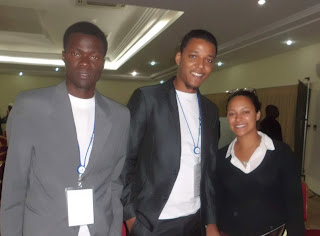Since I have been working with Rotary International I had the opportunity to attend the Bissau Economic Forum. T Institute Benten, Action for Development, and the Amilcar Cabral Institute were the hosts for the forum. The theme was “What would Amilcar Cabral Do?: Laying the Foundation for Guinea Bissau’s Economic Transformation. (Amilcar Cabral was the Revolutionary leader of Guinea-Bissau during the war for independence. )
 |
| Rotarac Bissau Crew- Abdu, Edu, and I |
I caught a
cab home, ran an iron over some more professional clothes and headed back to
the event. That was probably one of the
best decisions of my life! In attendance at this event was the President of the
Republic of Guinea Bissau, the former President of Nigeria, the Prime Minister
of Senegal, Bank Presidents, directors of many international non-profits, CEO’s and entrepreneurs, international
consultants, and professors from European
universities, and country ambassadors.
The forum
was dived into 4 parts. There were 3 panel sessions and a breakout discussion. The
1st panel topic was: Guinea
Bissau in the context of regional integration and Globalization. The second
panel topic was Strategies for the economic and social transformation of Guinea
Bissau. The last panel topic was Public-Private engagement and international
cooperation.
 |
| Panel Discussion |
It was pretty funny meeting someone and not
knowing what language they spoke. Generally if you started with one, the person
you were trying to talk to would give you the nod yes or no. But most people
had 2 out of the 3 under their belt, so once you figured out what language to
speak it was smooth sailing.
For the breakout
sessions I attended the one focused on agriculture. I think agriculture is important because it’s
political, social and economic while also being a huge human necessity. We all
have to eat regardless if the country you’re in is rich or poor. Anyways, there
were also other topics like tourism, energy development, infrastructural
development, and political stability. In each session we were asked to identify
some of the problems in the sector and come up with a solution ( Not knowing
that the President of the Strategic Investment Fund of Gabon, who manages the 2
billion dollar fund, would be offering to fund the groups with the best
solutions/projects).
The session
on agriculture was very interesting and had some of Guinea Bissau’s biggest
agricultural stakeholders. Guinea Bissau is still very much an Agriculture
based country and most GPD is generated from sales and exports in the cashew
industry. Given such, much of the conversation was focused on commercial
exports of rice, cashews, and mangoes and the possibilities for expansion.
However,
Guinea Bissau is one of the largest receivers of international aid. The rice I
eat every day is imported either as aid or for sale. So the other half of the conversation focused
on improving food security with-in the country.
 |
| The man on the left is one of the biggest names in agriculture |
But where
is the financial benefit of helping women in the interior feed their community?
Especially when exports like cashews are so profitable. I got the feeling that
the seemingly minimal (and gradual) return on investment in women in the agricultural
sector is why the issue wasn’t being as thoroughly addressed as exports.
I walked
away from that session feeling disheartened. The obstacles are huge, and the
more I learn and experience here, the more it seems to me that the biggest
obstacles are the minds of those in power positions. In speaking with my colleges
they expressed a similar feeling of disappointment. In their case, the older
folks were not receptive to the ideas of the youth at the table.
In
reflection about the event, two things didn’t get addressed that I felt are
pivotal to the development of Guinea Bissau. The first being investment in the
youth and the prioritization of sustainable, socially conscious developments
and investments. Youth were simply not mentioned at all and most investments
and developments being discussed are ones that are know to have negative
environmental impacts (drilling for oil, damn building for energy). I didn’t
once hear about solar panel investments.
I mentioned this at the event and someone
tried to explain that economic development is the focus of the forum. If investments in youth and sustainability
aren’t included in the conversation of economic development, let alone being
considered as remotely related, then there truly is a lot of work to be done.
Regardless
of my critique, I feel very blessed to have been able to attend the forum. Most
people watched it on TV or listened to it on the radio. It was a great learning
and networking experience and a glimpse at how working professionals work and
think.
No comments:
Post a Comment